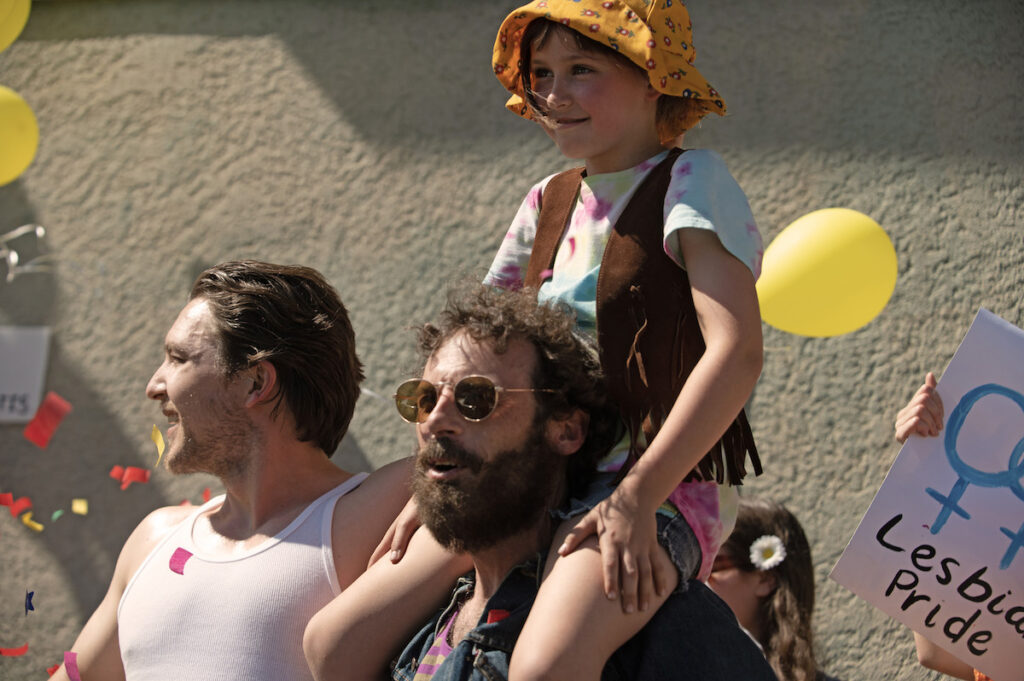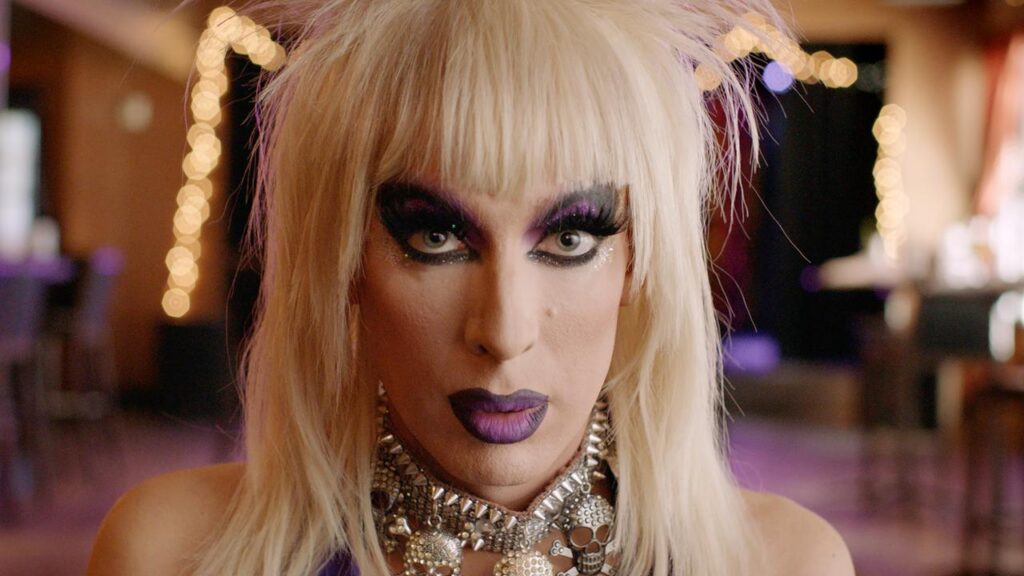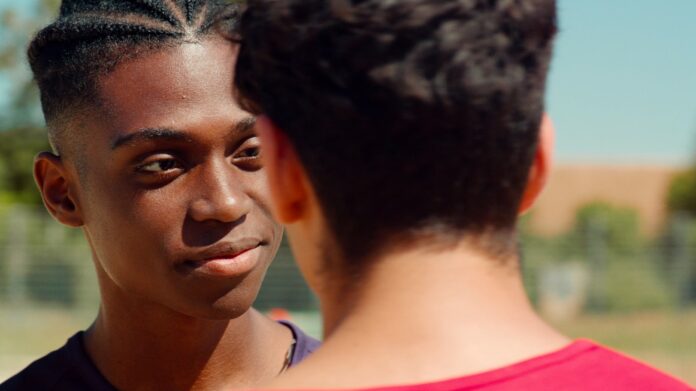San Francisco has certainly changed a fair amount in recent years, for better or worse, and local film exhibition has likewise, mostly for worse. But one thing that’s stayed miraculously stable for nearly a half century is Frameline, aka the SF International LGBTQ+ Film Festival. Back more or less full force this year (its 47th) after some COVID-compromised editions, the world’s oldest and largest event of its type runs at various venues in the city and in Oakland this Wed/14 through June 24, with a “streaming encore” available for home viewing Sat/24 to July 2. And yes, whatever the future may hold, a large share of its in-person screenings will duly be at the fest’s longtime home base, the Castro Theatre.

The opening night feature there is of particular local interest: Andrew Durham’s Fairyland is an adaptation of Alysia Abbott’s memoir of growing up in the Haight-Ashbury with her widowed father Steve, immersed in the gay hippie subcultures of the 1970s—and then in the AIDS epidemic which claimed his life. Steve Abbott, a personal friend and mentor, was a prolific author of poetry, essays and fiction, as well as an editor and general booster to SF’s experimental literary scene. His was a singular personality that would be difficult to replicate—though actor Scoot McNairy at times comes close, with other cast members in this bittersweet tale including Geena Davis and Adam Lambert.
The following night at Oakland’s New Parkway, the East Bay will get its own opening feature in Jac Cron’s Chestnut. It’s an alluring summertime drama, something of a Sapphic spin on The Mysteries of Pittsburg, in which a young woman planning to leave Philadelphia for LA falls in with a group of hip local party people whose obtuse relationships—and sexual preferences—play havoc with her emotions.
“Centerpiece” features at the Castro throughout the festival include Sundance prize-winning ensemble comedy Theater Camp, Hannah Pearl Utt’s bisexual farce Cora Bora, the documentary Who I Am Not (about an intersex couple in South Africa), and German-language historical epic Sisi & I. For the whole family, there’s a free screening of the new Pixar animation feature Elemental (a parable about tolerance) on Sat/17.

That late-breaking menace to society, drag queens—how will we ever undo the damage done to generations of vulnerable youth by Mrs. Doubtfire?!?—are center-stage in two other spotlit selections. Slotted as a “Pride Kickoff” on Fri/23, Jordan Danger’s God Save the Queens stars Alaska Thunderfuck (expected to attend) and other RuPaul’s Drag Race veterans in a high-octane camp melodrama that sounds a bit inspired by The Adventures of Priscilla. The unofficial closing selection on Sat/24, also at the Castro, will be Taylor Mac’s A 24-Decade History of Popular Music, which is both a portrait of the multitalented theatrical maestro, and a record of their titular marathon concept concert. It is directed by SF’s own multiple Oscar-winning duo Rob Epstein and Jeffrey Friedman (Common Threads, The Celluloid Closet).
Playing on Sun/18, the “Showcase” selection of Babatunde Apalowo’s Nigerian All the Colours of the World Are Between Black and White provides a somber fictive tale of two men struggling to connect within a virulently homophobic society. As ever, Frameline roams the globe to find representation onscreen, this year also encompassing features from Japan (Egoist, Old Narcissus), Spain (20,000 Species of Bees, Girlfriends and Girlfriends), the Philippines (About Us But Not About Us), Canada (Golden Delicious, Soft, This Place), Germany (Drifter), Italy (Girls Don’t Cry), Brazil (House of Izabel, Rule 34, M is for Mothers), France (Lie With Me, My Sole Desire), Norway (Norwegian Dream), Sweden (Opponent), Czech Republic (Ordinary Failures),Argentina (Pornomelancholia), Netherlands (Silver Haze), Mexico (The Trace of Your Lips), Denmark (The Venus Effect), and elsewhere.
In addition to the pile of brand-new shorts and features, the festival also offers some choice revivals, notably including Stephen Winter’s restored 1996 Chocolate Babies, a pioneering indie satire positing a group of “queer outcasts” as politicized anarchic superheroes, laying siege to Manhattan’s closeted hypocrites, homophobes and AIDS de-funders. “Neighborhood Nights” at three SF cinemas also bring back lesbian romance classic Desert Hearts, John Waters’ antic Serial Mom, and Chasing Amy, whose mixed-message legacy (it being to some a “straight man’s lesbian fantasy run amok”) also gets dissected in the new documentary Chasing Chasing Amy.
Other titles beyond Fairyland of special local interest include Tove Pils’ feature Labor, whose expat Swedish heroine explores SF’s kinky communities in a documentary that echoes Monika Treut’s prior such portraits. The double bill “Local Legends” teams mid-length tributes to writer-activist Jewell Gomez and the South Asian trans rights organization Parivar Bay Area.
There’s much more in Frameline’s 47th annual program, from world premieres to themed shorts collections to parties—too much to detail here. So we’ll just survey a few recommended individual features that were available for preview:
Ask Any Buddy
This clever found-footage pastiche by Elizabeth Purchell imagines a day in the life of a shape-shifting gay male protagonist enjoying a pre-AIDS sexual wonderland of endless hotness and hookups. His many, many-orgasmic adventures are wittily assembled from bits of 1970s and early 80s “all-male” XXX films by Arthur Bresson, Peter De Rome, Wakefield Poole, William Higgins, Tom DeSimone, Joe Gage, Fred Halsted, Peter Berlin, and others, plus glimpses of parades and protests, as well as lots of vintage music by gay artists. It’s part of an “Erotic Evenings” sidebar at the Roxie that also includes Wallace Pott’s upscale 1979 French porn feature Le beau mec (accompanied by Curt MacDowell’s sexual-diary short Loads from the next year), and two midlength early-1990s titles (Suburban Dykes, Safe Is Desire) by Debi Sundahl of Fatale Media.
Boys, “Big” & “Lost”
Two of the best entries in this year’s Outstanding First Feature Award competition involve underage protagonists figuring themselves out under pressure. In Corey Sherman’s US Big Boys, 14-year-old Jamie is disappointed his favorite cousin is dragging her new boyfriend along on their annual Lake Arrowhead camping trip—then a little too excited when the bf turns out to be a hunky dreamboat. Balancing laughs, warmth and lots of cringeworthy teen behavior, it’s an endearing debut. More serious in tone is the Zeno Graton’s Belgian The Lost Boys, whose titular figures are troubled youths at a juvenile correctional facility—an unlikely setting for romance, but love will find a way. It’s a tough-minded tale with room for plenty of amorous tenderness. Other coming-of-age narratives in Frameline this year include Shiva Baby director Emma Seligman’s new Bottoms, YA-novel-based Aristotle and Dante Discover the Secrets of the Universe, Canadian Before I Change My Mind, and French Winter Boy.
Going to Mars: The Nikki Giovanni Project
This complex audiovisual collage maps the life, times, and sensibility of the great African American poet-activist. As its title suggests, Joe Brewster and Michele Stephenson’s documentary reaches from extensive archival footage all the way into the cosmos to do its subject justice, while her writings are read on the soundtrack by Taraji P. Henson. It’s a first-rate tribute that’s just one among many films here celebrating queer artists in various media, others including Indigo Girls appreciation It’s Only Life After All, Hidden Master: The Legacy of George Platt Lynes (about the esteemed fashion and celebrity photographer), plus the self-explanatory likes of In Her Words: 20th Century Lesbian Fiction and Rock Hudson: All That Heaven Allowed.
Heartbeast
The throes of first love are anything but puppy-cute in Finnish writer-director Aino Suni’s feature. Androgynous 17-year-old Elina (Elsi Sloan) is a multilingual Scandinavanian teen bouncing between divorced parents in Germany and France, expressing her alienation from privileged surroundings as an aspiring rapper. What’s been shrugged off as ordinary adolescent angstiness reveals new shades, however, when she’s introduced to Sofia (Carmen Kassovitz), a dance student who’s the daughter of mom’s new boyfriend. Elina is smitten, then wounded, then manipulative, cunning, even malicious in her ever-increasing obsession with this flighty, immature object of desire. A stylish slow burn balanced between character study and thriller, it is not Frameline’s only suspenseful dip into genre terrain this year, others including sci-fi Frankenstein spin Birth/Rebirth, Hitchcockian The Origin of Evil from France, and bizarro teen nightmare Perpetrator.
Kenyatta: Do Not Wait Your Turn
State Representative Malcolm Kenyatta was the first openly gay person of color elected to the Pennsylvania House. An ambitious political prodigy from that state’s 3rd poorest district, he’d also be the first such elected to the US Senate… if he can beat two much more mainstream Democrat candidates, that is. Those Caucasian males respectively raise three and eight times the money his DIY war chest can summon. Everyone agrees he’s a great speaker, a terrific community uniter, and charismatic figure with a terrific future. Alas, Timothy Harris’ campaign-trail documentary ends up underlining how money talks loudest, particularly when a genuine progressive is pitted against middle-of-the-road party moderates. Inspirational nonetheless, this portrait sits alongside other nonfiction glimpses of queer resistance around the world, including Out of Uganda, Queendom (Russia) and How To Tell a Secret (Ireland).
Mutt
Fena (Lio Mehiel) is a twentysomething trans man whose transition is already fraught enough without the imminent arrival of her confused, judgmental father. Then he runs into the aggrieved ex who still thinks of Fena as his ex-girlfriend, and with whom some mutual feelings linger. Then there’s a sudden ambushing by the little sister who has no idea her estrangement from Fena wasn’t exactly the latter’s choice. These and yet more jarring events make for one very trying 24 hours leading in a complicated life hopefully on its way to being less so. Vuk Lungulov-Klotz’s nuanced seriocomedy joins an impressive array of trans narratives and documentaries at Frameline this year, also including Turkish Blue ID, Colombian Anhell 69, French Casa Susanna, Indian A Place of Our Own, and US Every Body and Kokomo City(like Mutt a Sundance prize-winner).
Playland
This episodic phantasmagoria of retro Boston life is conceptually adventurous, to say the least. Re-animating a late, longtime gay bar, Its stylized tableaux variously recall Ulrike Ottinger, Roy Andersson and Derek Jarman, while interviews and archival footage further recall life in the “Combat Zone,” a downtown-adjacent district of “adult” businesses and crime long since erased by gentrification. Embracing everything from choreography and operatic lip-synch to silent-movie intertitles, this is a sometimes challenging but rewarding hybrid feature. Also probing the more experimental side are the dance-focused Portuguese fantasy Will-o’-the-Wisp, and line-blurring Argentine Pornomelancholia, whose protagonist is a real-life “sex influencer” playing himself making an adult film within the film.
Rotting in the Sun
Similarly blurring reality/fiction lines, albeit in a more antic fashion, is this latest from Chile’s Sebastian Silva (Crystal Fairy). He plays a pitilessly drugged-up, sex-addicted, suicidal hot-mess version of himself, sent to a gay beach resort to “chill out.” There he meets obnoxious American Instagram celebrity/comedian Jordan Firstman (also playing an obnoxious alternative self), who immediately gloms onto him, to his mingled amusement and annoyance. Back in Santiago, this wicked fictive self-excoriation takes a drastic turn driven by Catalina Saavedra more or less reprising her domestic-gorgon role from the director’s breakout hit The Maid. When Rotting premiered earlier this year, its mix of graphic sexual content and repellent personalities turned off some viewers—but I found it utterly hilarious. Other prominent comedies in the festival this year include the German women’s-retreat sendup Clashing Differences and US bi wedding farce Jess Plus None.
Frameline47 runs June 14-24 at SF’s Castro and Roxie Theatres, Oakland’s New Parkway, and other venues. The entire program can be found here, a capsule film directory here, a day-by-day calendar here, ticket & pass info here.






